On Oct. 13, the Rev. Kathryn Cartledge and Elizabeth Eve, her partner of over three decades, applied for the second time for a marriage license. Their application denied, the couple sat down on the floor of the Buncombe County Register of Deeds office and proceeded to read out loud the 1,200 rights accorded to heterosexual couples who get married. When they refused to move, Sheriff’s deputies handcuffed and arrested them.
Almost an hour later, the two exited the office, holding hands. They were greeted by a cheering audience that sang the children’s gospel tune, “This Little Light of Mine.”
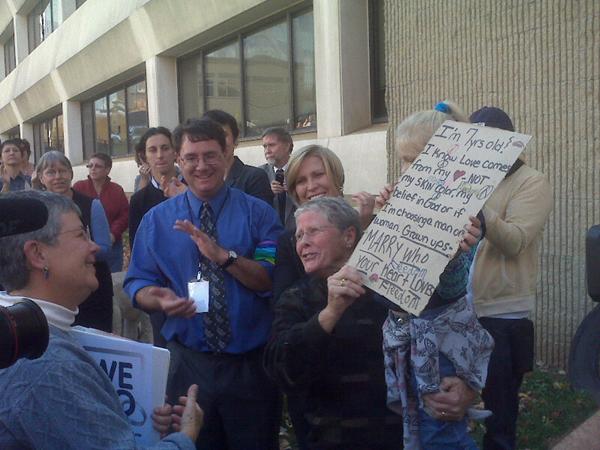
The welcome marked the culmination of the Campaign for Southern Equality’s first major initiative: WE DO. In the previous two weeks, a stream of couples had entered the Register of Deeds’ office to apply for a marriage license. On Oct. 13, more than 150 people made their way down for the campaign’s culmination.
The movement has quickly attracted national media attention — inclusion in a segment of MSNBC’s Lawrence O’Donnell show and a mention by talk-show host Ellen DeGeneres. But the origins behind an afternoon of civil disobedience and two weeks of public activism stretch back years and in many ways mark a very different approach to LGBT activism.
A new strategy
In 2004, Jasmine Beach-Ferrara, the CSE’s current director, gathered with her wife and several friends to start The Progressive Project, a workshop around community organizing.
“We were trying to develop new approaches,” she tells Xpress. “Since 2004 we’ve worked in LGBT rights and electoral campaigns in six cities across the country, primarly in Asheville and Boston.”
The participants worked on campaigns to defeat anti-same sex marriage amendments, as well as for political candidates.
“Basically, we were learning everything we could about campaign strategy and trying to help fill gaps. Basically we’d work on campaigns, figure out what would work, and then compare notes,” she says. “We had a very close vantage point on how these campaigns were run, and why we kept losing them: We’ve lost 30 since 2002.”
So the group wrote a series of strategy papers recommending changes, something Beach-Ferrara thought further on while she attended divinity school at Harvard (here’s an example of another Beach-Ferrara analysis of the failed campaign to stop California’s Proposition 8). The CSE emerged from those analyses.
“Basically it came from the lessons learned over those seven years: We realized there was a tremendous human need in the South for crisis response services, but also a tremendous opportunity for a different approach to organizing and a new strategy.”
The national LGBT movement, Beach-Ferrara notes, remains focused on incrementalism, marshalling resources in states where they believe a victory is possible in the near-term.
“In a typical year, about $530 million gets spent on LGBT issues nationally. Less than five percent of that goes to all 11 Southern states, because the South’s been written off as unwinnable,” she notes. “The majority of funding goes to California, New York, Massachusetts. The national movement’s strategy is to win in enough states that we can win on the federal level.”
The CSE’s approach is the opposite.
“While incrementalism has done some very important things, both strategically and morally, we need to work in the place where the need is greatest,” she says. “In America, that’s the South.”
“Organization and purpose”
In addition to focusing its efforts on an area traditionally ignored by major LGBT movements, the CSE is aiming at offense instead of defense — demanding the removal of laws against same-sex marriage instead of fighting against one specific initiative.
Also, the campaign prominently featured religious support. The kernel of the WE DO campaign was Beach-Ferrara’s thesis in divinity school. The CSE campaign’s offices — a single cinderblock room — are located in Asheville’s First Congregational Church, which donates the space for free. Clergy, in religious dress, marched at the head of the Oct. 13 rally and figured prominently both as demonstrators and advocates for the campaign. At the rally, three of them, including a Baptist pastor from Raleigh, swore they wouldn’t personally perform marriage ceremonies again until same-sex marriage is legal.
Cartledge, a minister in the United Church of Christ, knew Beach-Ferrara and the Progressive Project before she departed for divinity school. After her return, the two conferred about the WE DO campaign. Cartledge and Eve sponsored the first of ongoing monthly “family dinners” that serve as both social and strategy time for WE DO participants and friends. They were impressed by the level of planning behind the campaign.
“When you’re 65, you find out you don’t have any time to waste,” Cartledge tells Xpress. “If it’s not something that looks like it has organization and purpose and forward motion, then we probably would have left it alone, but we found just the opposite.”
Cartledge, an activist for many years in dealing with homelessness and AIDS, praised Beach-Ferrara’s approach as “very organized: she dots every ‘i’ and crosses every ‘t.’ “That woman is hard to say no to,” she adds, with a chuckle. “She was timely, politically, in seeing the South as a stronghold against change.”
Cartledge believes the most compelling part of the campaign is its “moral basis, that we change people just by changing our reactions to them in a positive way.”
“When it comes to loving, committed relationships, there’s a higher law than the written law.”
Denied
On Oct. 3, the first couple — Cartledge and Eve — entered the offices of Register of Deeds Drew Reisinger. In a pattern that would soon become familiar, they placed the money for the application fee and a completed application down on the table. Their application was denied.
The campaign came as no surprise to Reisinger, who personally supports its goals. Beach-Ferrara had informed him about it six months earlier.
“She let me know it was happening, I was able to meet the majority of the couples well before it happened, to hear their stories,” he says. “The personal touch, the human part is why I think this campaign was so successful. It made it clear these people had real lives, children — and they’re not just radical, they’re human beings.”
“They did an absolutely wonderful job organizing it,” he adds. “Beach-Ferrara did a lot to ensure the safety of everyone involved by pre-arranging meetings with myself, the APD and the Sheriff’s department. I couldn’t be more proud of the way she organized it.”
Reisinger appreciated that the campaign repeatedly made it clear that they were targeting the laws, not he or the workers in his office.
“The focus was on the unjust laws of the state of North Carolina,” he says. “I look forward to the day when I can issue marriage licenses to couples of the same sex and I’ll do everything I can to support their cause,”
Over the two-week campaign, 20 couples would apply for a license, while WE DO volunteers videotaped their stories and put them online.
“The couples that have been denied licenses are in loving, committed relationships and they seek what so many other couples do — the right to marry legally. The couples who have participated in the WE DO Campaign to date have been together for a collective total of over 143 years,” an Oct. 7 announcement from the CSE declared, promising intensifying effort and a then-unspecified act of civil disobedience.
Marching to Zion
On Oct. 14, a very windy Friday, about 150 supporters of the campaign gathered in Pack Square Park.
“We are starting a new Southern equality movement,” Beach-Ferrara told the assembled crowd. “This is a story we’ve known our whole lives: that we live in a country where the laws insist we are second-class citizens. That usually gets enforced behind closed doors, and the pain usually stays in the privacy of our own lives.
“But what’s happening right now is that we are making this story public: we are saying that these laws are unjust, they are unfair, they are immoral, they are illogical, and they must change.”
Cartledge then took the stage to deliver a fiery speech.
“Folks, I stand here with you today because I am tired of giving in!” she shouted to the crowd. “I believe that it is vital for us to understand the right to marry in the context of civil rights.”
She noted that it took 72 years from the time suffragettes first began agitating for women to gain the right to vote, and that judges defending interracial marriages had often labeled the relationships contrary to divine will and unnatural.
“Does this sound familiar?” she said. “I believe the right to marry is the right of the individual and not based on the color of skin or sexual orientation… The church should not have a dog in this fight unless it is to back up the LGBT community against the laws that exclude us, that treat us as second-class citizens.”
Following a blessing, the crowd made its way down College Street towards the register’s office, where sheriff’s deputies awaited them. The majority of the marchers formed lines to show their support for the couples who walked up the steps.
Many of the couples who had come through earlier in the campaign came through again and were again denied.
“According to North Carolina state statutes, we’re going to deny y’all a marriage license today,” went a typical response from Reisinger. “It’s with sincere regret that I have to tell you this, but until North Carolina state statute changes, we will not be able to issue you a marriage license.”
The couples thanked Reisinger several times, and one handed him a card, praising how he and his staff conducted themselves throughout the campaign.
Among the couples were local radio host Jerri Jameson and her longtime partner, Susan, who went up to the desk holding hands.
“After years together, we’d like to get married,” Jameson told Reisinger. “She finally said ‘yes.’”
“She’s lying,” her partner said. “I said ‘yes’ many years ago.”
After 12 couples made their requests, Cartledge and Eve came through one last time. They were again denied.
The two then sat down in the middle of Reisinger’s office and began to read a list of 1,200 federal rights given to heterosexual married couples.
They reached the section on pension and tax benefits before Sheriff’s deputies informed them they had to leave. When they refused, Eve and Cartledge were handcuffed and taken out of the office, both were charged with second-degree trespassing.
“I’m 65, we’re self-employed, we don’t have as much to lose as someone younger would have with jobs or parents or employers,” Cartledge says of her reasons of choosing to face arrest. “I saw a lot of couples half our age, with young children. They have more to lose but, in some ways, more to gain” if the laws against same-sex marriage are overturned.
The night, MSNBC’s The Last Word with Lawrence O’Donnel featured the campaign.
The media attention continued. On Oct. 19, talk-show host Ellen DeGeneres tweeted a link to the WE DO campaign’s video to her 7.8 million followers.
“Here’s a peaceful demonstration for the right to marry,” DeGeneres wrote. “Why would anyone want to deny these people that right?”
Next steps
“When LGBT folks, who live with the fewest protections, face the most robust opposition and have the fewest resources say ‘we’re not going to take it anymore,’ and we’re going to resist these laws directly, there’s a human power in that,” Beach-Ferrara says. “I think that’s part of why this campaign has touched so many people.”
The campaign is just beginning, she adds.
“We’ll be expanding to other communities in North Carolina in 2012 and across the South in the years to come,” with efforts similar to the WE DO campaign.
The CSE also provides community law workships, including free legal advice, as well as crisis response and support services to victims of hate crimes and discrimination.
“If something bad happens to you in many parts of the South, there’s no one to call locally, so we’re trying to provide an alternative,” she says. “We have a really amazing team of counselors and clergy and attorneys who have stepped up to run these services.”
The CSE’s staff is expanding too. Lindsey Simerly, formerly the director of field and outreach at Rep. Heath Shuler’s campaign, is joining the CSE full-time at the beginning of November. She’ll help with community organizing. She said that while volunteering with the WE DO campaign, she was impressed by the level of practicality and, like Cartledge, by the amount of organization.
“I’ve been volunteering for them for a bit, and was so inspired by the organization itself,” Simerly says. “They’re really doing something different. They’re doing LGBT work in the South that is not angry, that is not confrontational, that’s saying it’s time for the laws in this country to change. They’re working in churches, they’re working in ways that are effective and, quite honestly, that I haven’t seen from other LGBT organizations.”
While national polls have shown increasing — and even majority — support for same-sex marriage over the past year, the issue remains contentious throughout the state. North Carolina is the only Southern state without a Constitutional amendment banning same-sex marriage. But an amendment, approved by the GOP-controlled legislature, will be on the ballot next May. If passed, it would also prohibit domestic-partner benefits and might even ban benefits to same-sex couples from private business or contracts. One of the bill’s main sponsors, state Sen. James Forrester, called Asheville a “cesspool of sin” while stumping for the bill, and later added Chapel Hill and Wilmington to his list of sinful municipalities.
But, Beach-Ferrara says, the positive response to the WE DO campaign keeps pouring in, and she believes they’ve struck a chord.
“We’re hearing from people all across the country and throughout the South on this. What that speaks to is the power of everyday people realizing they’ve lived with these laws their whole life, and now they’re ready to fight back.”


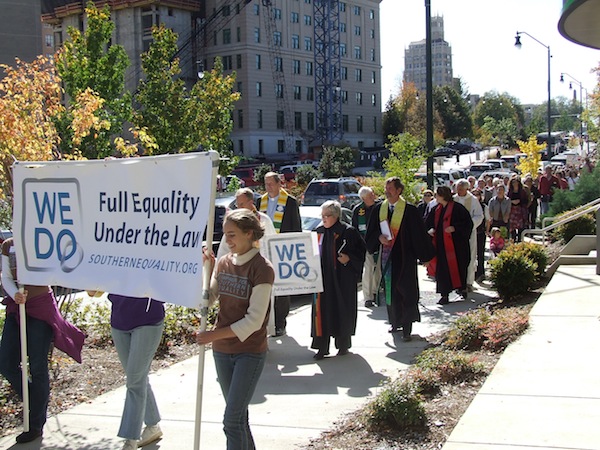
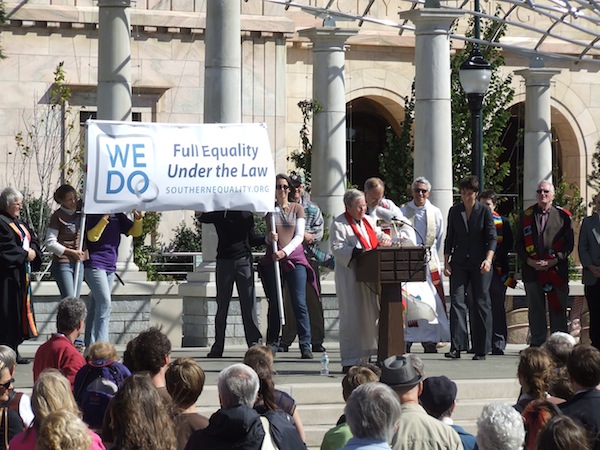
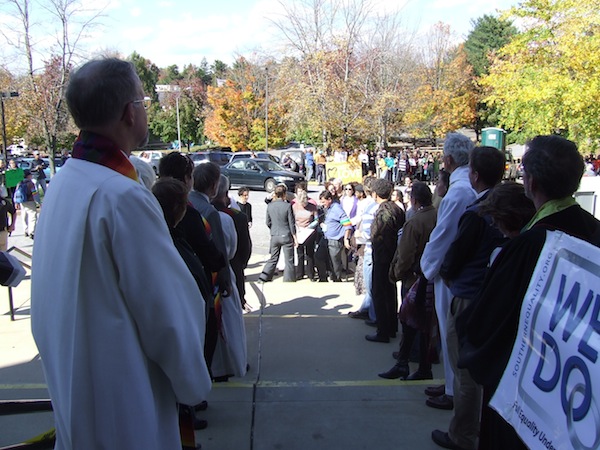
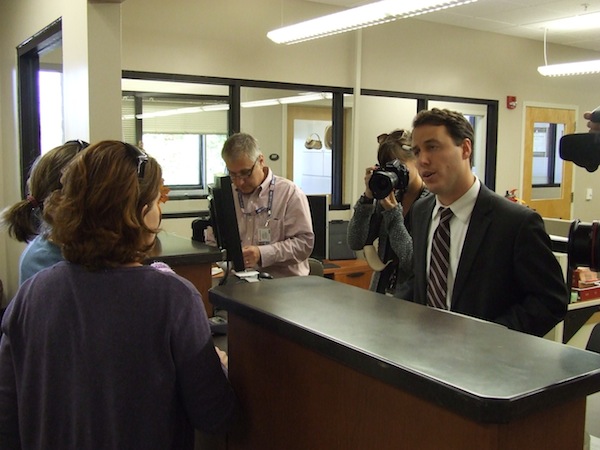
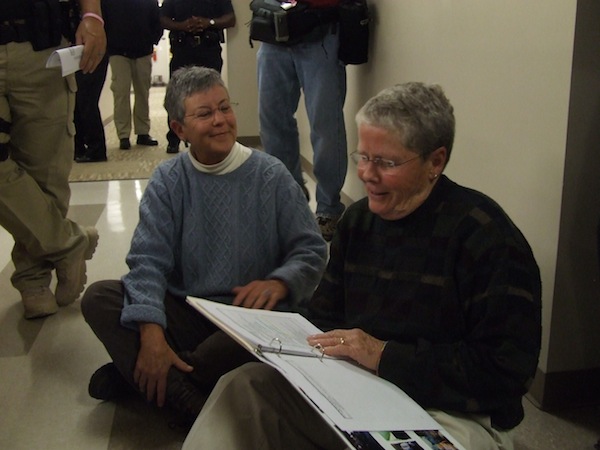
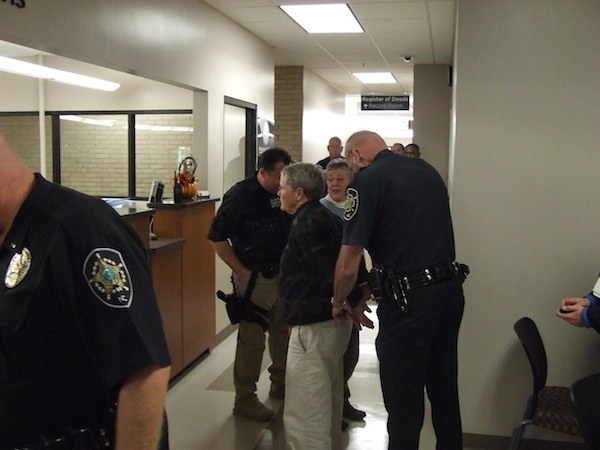
If civil disobedience is the key, why doesn’t Drew man up and hand out a marriage license? What’s the worst that would happen? A law suit? The NCGA can’t fire him, the Register of Deeds is an elected position. Who knows, the court might even find that the license was legal.
Drew actions are cowardly in the light of such bravery by others.
GOD IS COMING SOON DONOT BE WITH YOUR SAME SEX HELL IS HOT
Don’t hold your breath for too long, you live the way you want to live and let them live how they want to live, WITHOUT having to hear about your God coming to get them. Their love is probably a lot realer than your God.
Just wanted to say that I support all of you and I think it is ridiculous that this is still an issue today. I am sorry that some people are so ignorant.
I also support them!! Keep up the work .. one day it will pay off .. you can defeat the ignorant people!